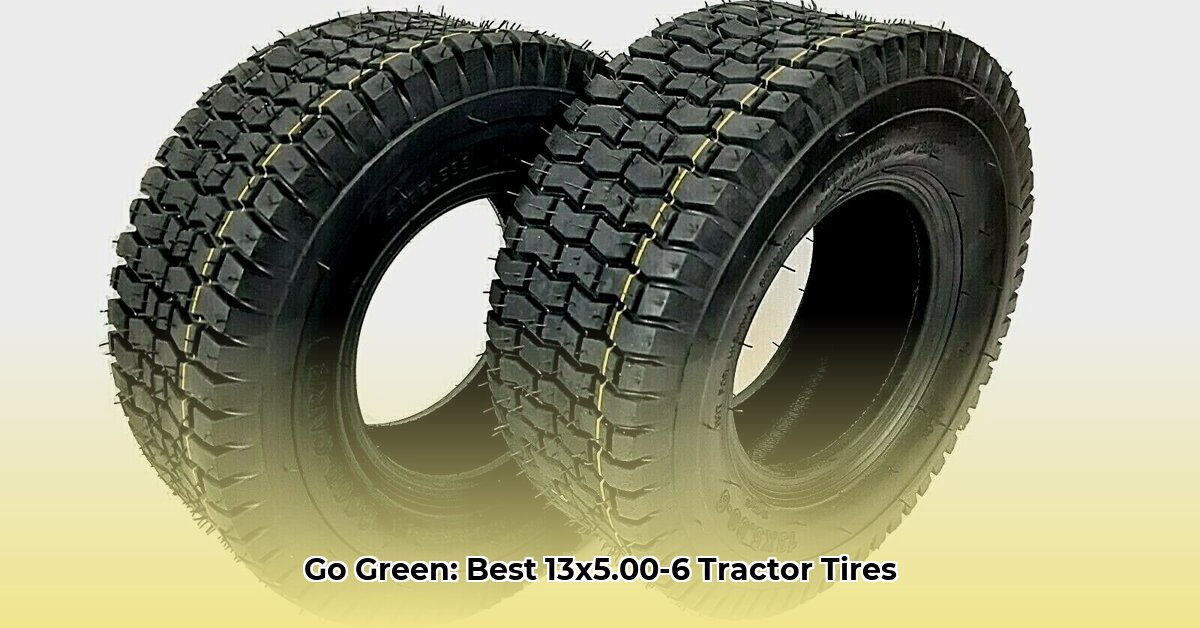
Choosing tires for your lawn equipment might seem insignificant, but selecting sustainable options significantly impacts environmental health. This guide focuses on 13x5.00-6 tires, a common size for lawn tractors and smaller riding mowers, helping you navigate the choices to find the best eco-friendly fit. For more information on other tire sizes, check out this helpful resource on 10-0-16 tractor tires.
Understanding 13x5.00-6 Tires and Their Environmental Impact
The ubiquitous 13x5.00-6 tire size equips numerous lawn tractors and riding mowers. However, the environmental impact of these tires often goes overlooked. Traditional tires heavily rely on petroleum-based materials, whose production and disposal contribute to greenhouse gas emissions and pollution. But what are the sustainable alternatives?
Tire Construction and Materials: Decoding the Eco-Friendly Factor
Several key factors determine a tire's eco-friendliness. Let's break them down:
Rubber Composition: This is paramount. Look for tires with a higher percentage of recycled rubber content. Some manufacturers are exploring bio-based alternatives like guayule or dandelion rubber, promising a far more sustainable approach. However, further research is needed to fully assess their long-term durability and performance.
Manufacturing Process: Sustainable manufacturing minimizes energy consumption and waste generation. This is not always easy to verify but remains a critical consideration. Look for certifications or information from the manufacturer detailing their production processes and commitment to sustainability.
Tire Lifespan: A longer-lasting tire inherently reduces the need for replacements, lowering overall waste and resource consumption. Proper inflation and routine maintenance are crucial for extending the lifespan.
Recyclability and End-of-Life Management: The disposal of old tires poses considerable environmental challenges. Choosing tires with higher recyclability ratings ensures they are diverted from landfills and processed responsibly.
Comparing Sustainability: A Simplified Overview
The following table compares hypothetical tire types, highlighting their sustainability attributes. Note that actual values vary significantly depending on the specific product and manufacturer. Always consult manufacturer specifications for accurate data.
| Tire Type | Recycled Rubber (%) | Bio-Based Materials (%) | Manufacturing Impact (Scale of 1-5, 5 being highest) | Lifespan (Years) | Recyclability (Scale of 1-5, 5 being highest) | Soil Compaction (Scale of 1-5, 5 being highest) |
|---|---|---|---|---|---|---|
| Conventional Rubber | Low | 0 | 5 | 2-3 | 1 | 4 |
| Recycled Rubber Blend | Moderate | 0 | 3 | 2-4 | 3 | 3 |
| Bio-based Rubber Blend | Low | High | 2 | 2-3 | 3 | 2 |
Choosing Sustainable 13x5.00-6 Tires: A Step-by-Step Guide
Assess Your Needs: Consider your mowing frequency and terrain. More demanding conditions may necessitate more durable (and potentially less sustainable) options. A balanced evaluation is key.
Research Manufacturers: Seek companies dedicated to sustainability. Scrutinize their web presence and product information for transparency regarding their environmental impact.
Seek Independent Reviews: Examine unbiased reviews to evaluate real-world performance and lifespan. This provides invaluable insights not always present in manufacturer marketing.
Compare Total Cost of Ownership (TCO): While sustainable tires may have a higher initial purchase price, their potentially longer lifespans can result in cost savings over time. A comprehensive TCO assessment is crucial.
Responsible Disposal: Investigate and utilize local tire recycling programs to ensure environmentally sound disposal at the end of the tire's life cycle.
Key Takeaways: Making a Sustainable Choice
Choosing sustainable lawn mower tires is a significant step toward environmentally responsible landscaping. Prioritize recycled rubber content, bio-based materials, and responsible manufacturing processes. A longer-lasting tire minimizes waste, while proper disposal practices prevent environmental harm. Finally, remember to consider the total cost of ownership when making your purchase. Sustainable choices are not only better for the planet; they can also be a smart, long-term investment.